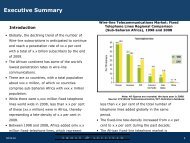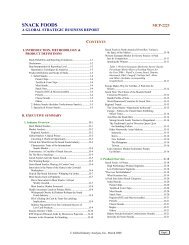the RUSSIA oil & gas competitive intelligence report - Report Buyer
the RUSSIA oil & gas competitive intelligence report - Report Buyer
the RUSSIA oil & gas competitive intelligence report - Report Buyer
Create successful ePaper yourself
Turn your PDF publications into a flip-book with our unique Google optimized e-Paper software.
Russia Oil and Gas Competitive Intelligence <strong>Report</strong> 2010<br />
companies to develop offshore fields on <strong>the</strong>ir own or in partnership with o<strong>the</strong>r companies. The newspaper<br />
<strong>report</strong>ed, however, that it is unclear whe<strong>the</strong>r <strong>the</strong> proposal has been submitted to <strong>the</strong> Russian cabinet.<br />
Under legislation passed in 2008, offshore fields in Russia can only be developed by companies in which<br />
<strong>the</strong> government owns a stake of 50% or greater. In addition, companies applying to work on <strong>the</strong> fields<br />
must have a five-year record of working on such projects, effectively limiting participation to Gazprom<br />
and Rosneft. It is arguable that this has damaged Russian investment in offshore areas. In 2008, <strong>the</strong> two<br />
companies invested only RUR56.4bn (US$1.9bn at current rates) in E&P offshore Russia, a rate which<br />
Donskoy claimed would mean ministry targets for offshore areas would take 165 years to fulfil.<br />
The fact that offshore projects are effectively limited to just two state companies, preventing o<strong>the</strong>r<br />
Russian and international companies from participating, has slowed <strong>the</strong> development of <strong>the</strong>se areas.<br />
According to <strong>the</strong> Moscow Times, <strong>the</strong> CEO of ConocoPhillips, Jim Mulva, claimed in March 2010 that<br />
<strong>the</strong> legally-privileged position of Gazprom and Rosneft had led to slower growth for <strong>the</strong>ir privatelyowned<br />
rival Luk<strong>oil</strong>, in which Conoco holds a 20% stake (which it is reducing to 10%). If <strong>the</strong> ministry<br />
proposal is accepted, it could <strong>the</strong>refore present significant opportunities to IOCs.<br />
Russia is <strong>the</strong> major <strong>gas</strong> exporter to Europe but <strong>the</strong> reliability of its supplies in <strong>the</strong> past few years been<br />
causing concern, thanks to pricing disputes with transit states such as Ukraine, frequent pipeline incidents<br />
and <strong>the</strong> capriciousness of <strong>the</strong> Russian wea<strong>the</strong>r. The Kremlin sees Asia <strong>the</strong> future source of export growth,<br />
but <strong>gas</strong> pipeline projects to <strong>the</strong> east of <strong>the</strong> Ural Mountains remain in <strong>the</strong> planning stages.<br />
The country has an extensive <strong>gas</strong> export pipeline network bound for <strong>the</strong> western markets. Some of <strong>the</strong><br />
infrastructure, however, has fallen into considerable disrepair, which is most acute in <strong>the</strong> poorer Former<br />
Soviet Union (FSU) countries that now serve as transit states on <strong>the</strong> way to <strong>the</strong> EU. In order to diversify<br />
its export routes, gain greater security of transport and maintain a closer grip on ex-communist states,<br />
Russia has been looking to construct new pipelines bypassing Eastern Europe.<br />
© Business Monitor International Ltd Page 66









